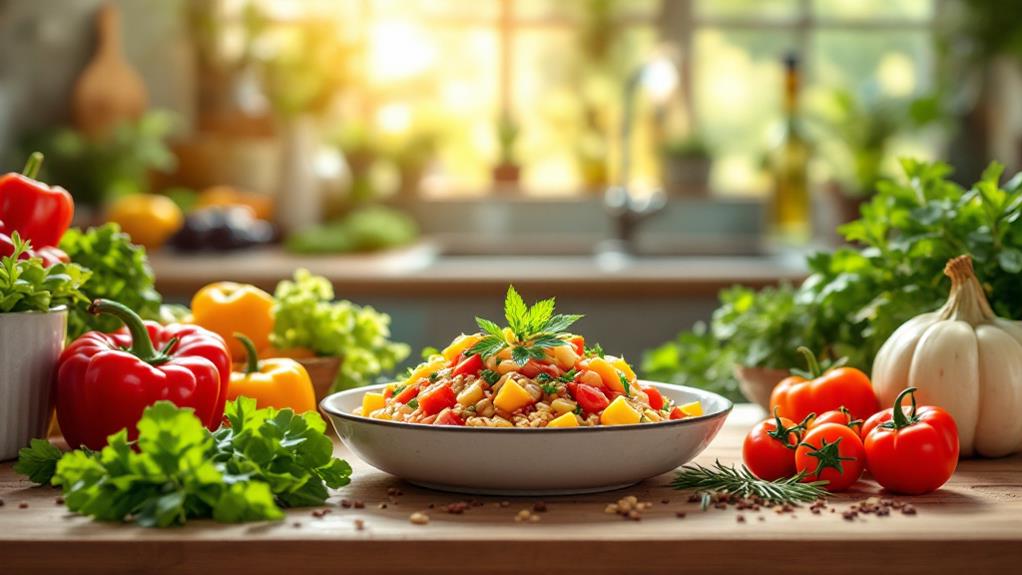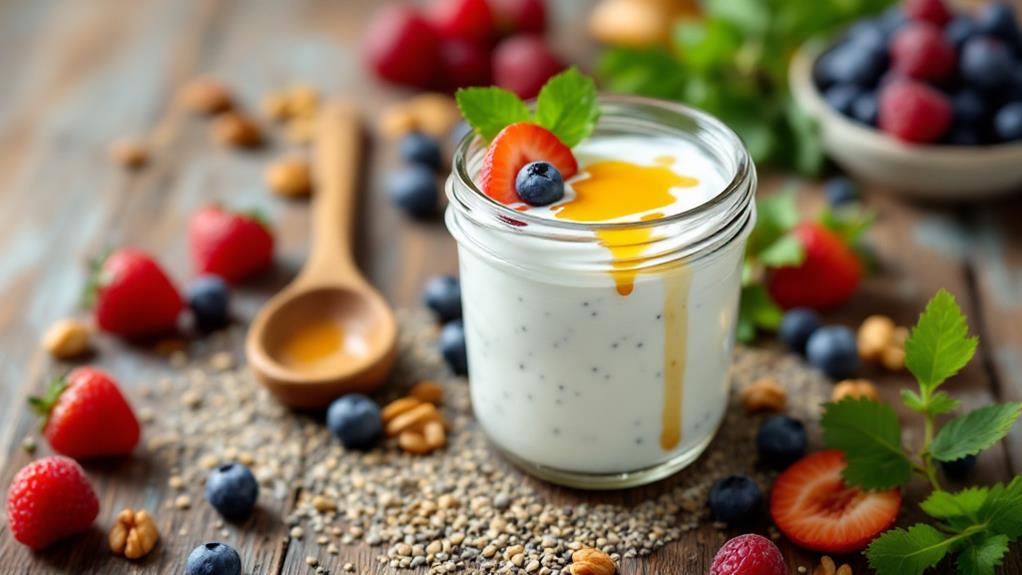20 Exotic Fruits to Consider Adding to Your Diet
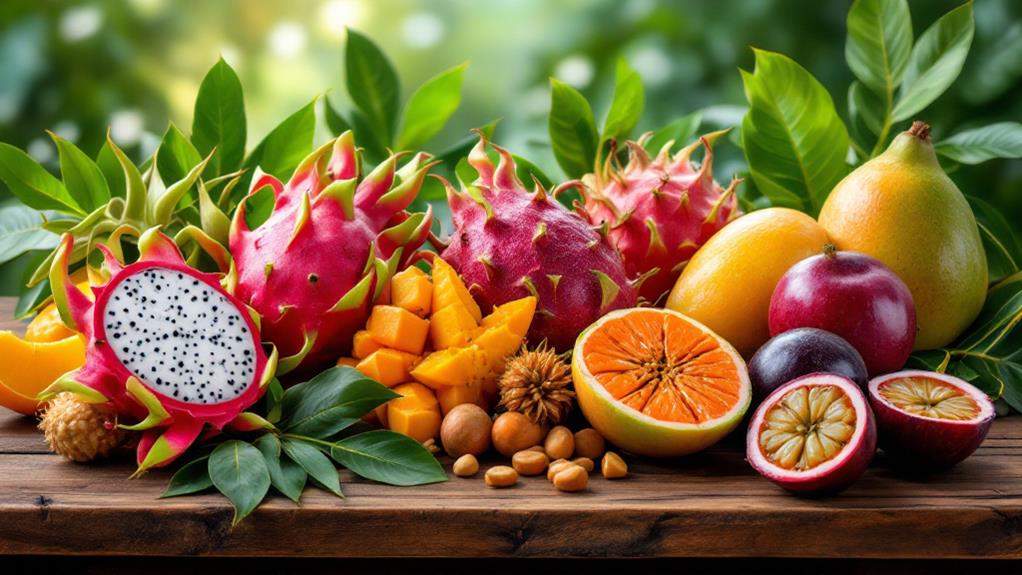
Enhance your diet with exotic fruits that are not only flavorful but also packed with nutrients. Include mangos and guavas for a dose of vitamin C. Savor the creamy texture of avocados and the unique sweetness of lychee. Don't miss the fibrous benefits of passion fruit and the antioxidant-rich acai berries. Investigate the tangy taste of tamarind and the star fruit's distinctive shape. Papaya and pineapple offer digestive support, while dragon fruit and rambutan bring lively colors to your plate. These fruits promise more than just a taste adventure; they are nutritious elements worth uncovering further.
Mango
Brimming with nutrients and flavor, mangoes are a tropical delight you should definitely consider incorporating into your diet. This lively fruit is high in vitamin C, offering an impressive 60.1 mg per cup, which fulfills 67% of your daily needs. This crucial nutrient enhances your immune system and helps with collagen production, keeping your skin healthy and glowing. Besides vitamin C, mangoes are rich in antioxidants, particularly carotenoids, which support immune function and may help reduce inflammation. These compounds work to protect your cells from oxidative stress, offering significant health benefits.
Integrating mangoes into your meals is not only beneficial but also incredibly versatile. You can enjoy this fruit fresh, toss it into smoothies, or include it in salads for a touch of sweetness. Mangoes also work well in both sweet and savory dishes, enhancing the flavors with their natural sweetness. Plus, with around 3.07 grams of dietary fiber per cup, mangoes contribute to digestive health and promote feelings of fullness, making them a smart choice for those watching their weight. Regardless of being fresh, dried, or pureed, mangoes make a delicious and healthful enhancement to any diet.
Papaya
Papaya is a powerhouse of nutrition that you should consider adding to your diet. Not only is it deliciously sweet, but it's also packed with vitamin C, providing a whopping 88.3 mg per cup. This amount covers 98% of your daily vitamin C needs, playing an essential role in supporting immune function and maintaining radiant skin. Including papaya in your meals can be a tasty way to bolster your health.
Beyond vitamin C, papaya is loaded with fiber—about 2.5 grams per cup. This high fiber content promotes digestive health, helping you feel full and satisfied while also aiding in maintaining a healthy digestive system. The presence of the enzyme papain in papaya is another bonus. Papain assists in breaking down proteins, enhancing digestion, and potentially reducing inflammation.
If you're watching your calorie intake, papaya is a smart choice, containing just 62 calories per cup. Despite being low in calories, it's rich in antioxidants like carotenoids. These antioxidants help combat oxidative stress, contributing to comprehensive well-being. By incorporating papaya into your diet, you'll be treating your body to a burst of nutrition and flavor, supporting both health and taste buds.
Pineapple

One tropical delight you should consider incorporating into your diet is pineapple. This lively fruit isn't just delicious; it's packed with vitamin C, offering a whopping 78.9 mg per cup. That's 88% of the daily value you need for enhancing your immune system and maintaining healthy skin. As a tropical fruit, pineapple brings a taste of the tropics to your meals, all while supporting your health.
Pineapple also contains bromelain, an enzyme known for its anti-inflammatory properties. It can help reduce swelling and aid digestion, making it a beneficial supplement to your diet. Manganese is another important nutrient found in pineapple, with each cup providing 1.53 mg, or 67% of the daily value. This mineral is essential for bone health and metabolism, ensuring your body runs smoothly.
If you're watching your weight, pineapple is a smart choice. With only about 82 calories per cup, it fits well into weight management plans. Its sweet and tangy flavor can transform meals, regardless of whether you enjoy it fresh, grilled, or blended into smoothies. So go ahead, add some pineapple to your diet and savor the benefits!
Banana
After enjoying the tropical allure of pineapple, it's time to investigate another staple fruit: the banana. This adaptable fruit isn't just delicious; it's packed with nutrients that can enhance your health. Bananas are high in fiber, providing about 3.07 grams per cup. This fiber aids digestion and helps you feel full longer, making bananas an excellent choice for weight management. With only about 105 calories per medium-sized banana, they're a guilt-free snack you can enjoy anytime.
Bananas are also a great source of vitamin C, offering approximately 10.3 mg per fruit. This vital vitamin supports your immune health and helps keep your skin looking lively. Moreover, bananas are rich in potassium, with around 422 mg per medium fruit. This mineral is significant for maintaining proper heart and muscle function, ensuring your body runs smoothly.
You can enjoy bananas in numerous ways. Eat them raw for a quick snack, blend them into smoothies for a nutritious enhancement, or use them in baked goods for added flavor and moisture. Their adaptability makes bananas a must-have in any diet, providing both health benefits and culinary delight.
Acai
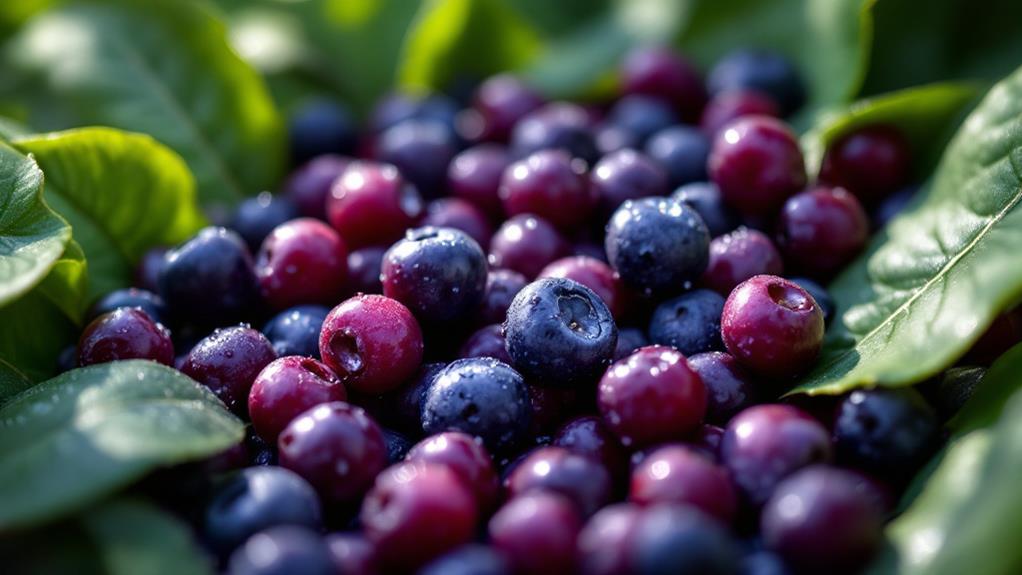
Among the colorful offerings of exotic fruits, acai stands out as a powerhouse of nutrition and flavor. Native to the Amazon rainforest, acai berries have been cherished by indigenous tribes for their health benefits. They're packed with antioxidants, especially anthocyanins, which help combat inflammation and neutralize harmful free radicals in your body. This protective role supports general health and well-being, making acai a smart supplement to your diet.
A one-cup serving of acai provides about 112 mg of vitamin C, covering 124% of your daily value. This increase is fantastic for your immune system and skin health, helping you stay resilient against common colds and maintaining a lively complexion. Plus, acai is naturally sugar-free and low in calories, fitting seamlessly into smoothies or bowls without derailing your dietary goals.
You'll often find acai available in powdered or puree forms, offering versatility in the kitchen. Regardless of if you're crafting a revitalizing smoothie, a delightful dessert, or a nutritious energy bar, acai amplifies your recipes with both flavor and nutritional benefits. Consider incorporating this exotic berry into your culinary repertoire to enjoy its rich health benefits.
Avocado
Avocado, often hailed as a superfood, is a nutrient-dense fruit that can improve your diet with its rich blend of important nutrients. Among exotic fruits, avocados stand out for their impressive content of healthy monounsaturated fats, particularly oleic acid. These fats play a significant role in lowering bad cholesterol levels, thereby promoting heart health. By incorporating avocados into your meals, you're not just adding flavor but also a nutritional powerhouse.
One of the standout features of avocados is their fiber content, with about 10 grams per fruit. This accounts for 35% of your daily value for dietary fiber, which is necessary for supporting digestive health. Furthermore, avocados are packed with key vitamins and minerals, including a substantial 728 mg of potassium (15% DV), which helps maintain proper fluid balance and muscle function.
Avocados are also an excellent source of vitamin E, offering roughly 2.07 mg per fruit (14% DV). This vitamin is renowned for its antioxidant properties, which are beneficial for skin health. Regardless of whether you enjoy avocados in salads, smoothies, or as a spread, they add a delightful and nutritious twist to your diet.
Guava
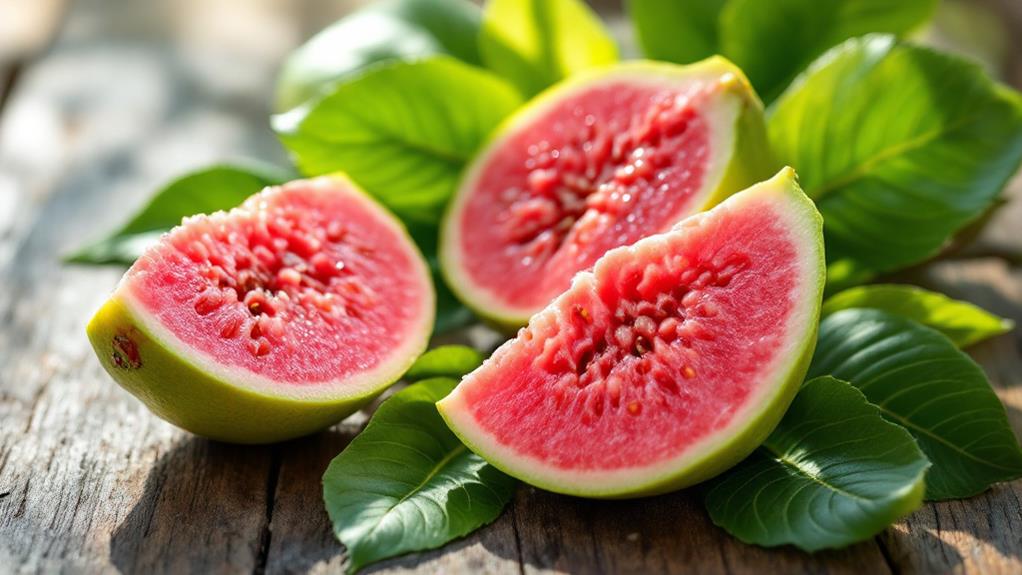
You'll find that guava is a powerhouse of nutrition, offering an impressive array of health benefits. This tropical fruit is exceptionally rich in vitamin C, providing a staggering 376 mg per cup. That's 417% of your daily value, making guava a stellar choice for improving your immune system. But guava doesn't stop there; it's also packed with antioxidants, including flavonoids and carotenoids, which are essential for combating oxidative stress and reducing inflammation.
Incorporating guava into your diet offers more than just a vitamin C enhancement. With 8.91 g of dietary fiber per cup, guava aids digestion and keeps you feeling full longer, promoting satiety. It's also a great source of potassium, delivering about 688 mg per cup, which supports your heart health and helps maintain healthy blood pressure levels.
The versatility of guava makes it easy to enjoy in different culinary applications. You can eat it fresh, juice it, or add it to salads, smoothies, and desserts. By doing so, you not only improve the flavor of your dishes but also greatly increase their nutritional content. So, why not give this tropical fruit a try?
Sapodilla
After uncovering the benefits of guava, it's time to investigate another tropical gem—sapodilla. Known as the "candy of the fruit world," sapodilla features a sweet, malty flavor that's simply irresistible. This tropical delight is packed with vital nutrients, including vitamin C, vitamin A, iron, folate, and niacin, making it a powerhouse of antioxidants. The high vitamin C content not only enhances your immune system but also promotes healthy skin and fights free radicals.
Sapodilla is rich in dietary fiber, which aids digestion and supports gut health. Its fiber content helps maintain regular bowel movements and can even assist in weight management by promoting a feeling of fullness. You can enjoy this fruit fresh, toss it into smoothies, or use it to naturally sweeten oatmeal and yogurt.
Native to regions of Mexico, Central America, the Caribbean, and Asia, sapodilla is usually available from late summer to early winter. A single sapodilla contains about 140 calories and offers a multivitamin-like nutrient profile, making it a nutritious supplement to your diet. So, next time you're looking for a tropical treat, consider including sapodilla in your menu for a flavorful and healthy enhancement.
Mangosteen
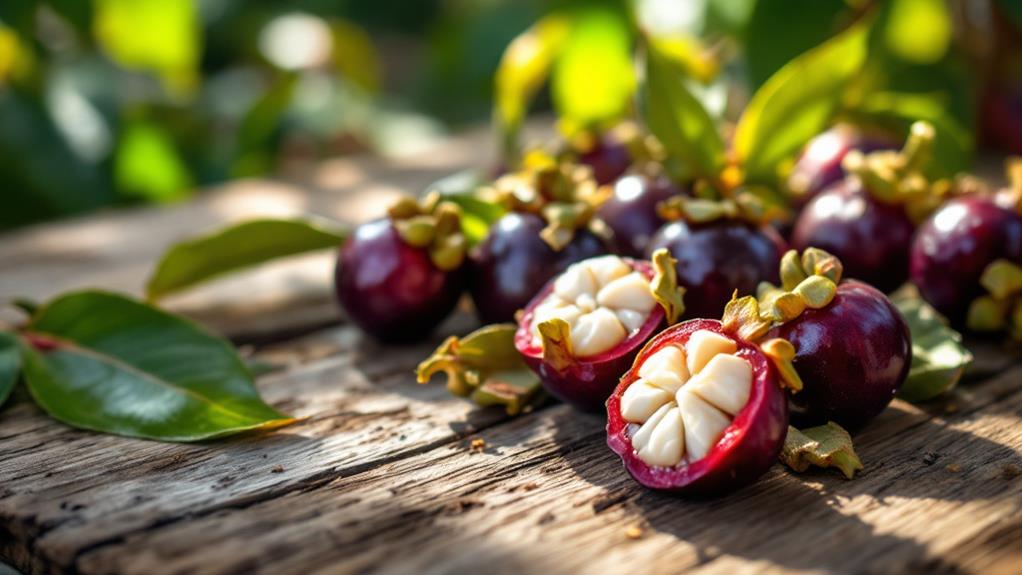
Mangosteen's regal reputation as the "queen of fruits" is well-deserved, thanks to its distinctive thick purple rind and sweet, juicy white flesh. This exotic fruit is not only a feast for the senses but also a powerhouse of nutrition. Packed with antioxidants, particularly xanthones, mangosteen possesses anti-inflammatory properties that can be a blessing for your general health. The high levels of vitamin C found in mangosteen are an excellent enhancement for your immune system, helping you fend off common illnesses.
Beyond its health benefits, mangosteen's versatility in the kitchen is worth exploring. You can enjoy it fresh, incorporate it into juices or desserts, or even find it canned. This adaptability makes it an easy supplement to any diet. If you're looking to introduce mangosteen into your meals, keep an eye out for it in specialty grocery stores or online, especially during its peak season from June to September.
Regularly incorporating mangosteen into your diet can help combat oxidative stress and inflammation, making it a valuable ally in maintaining wellness. Don't miss out on this tropical delight that not only satisfies your taste buds but also supports your health.
Durian
Among the many exotic fruits that could spice up your culinary adventures, durian stands out as a unique contender. Often called the "king of fruits," this tropical delight is native to Southeast Asia and instantly recognizable by its spiky rind and potent aroma. While its smell can be polarizing, don't let that deter you from exploring its many benefits. Durian is rich in vitamin C and high in antioxidants, making it a nutritional powerhouse that supports your comprehensive health and well-being.
Here's what makes durian an intriguing choice:
- Nutrient-rich: A cup of durian provides 1,060 mg of potassium and 47.9 mg of vitamin C.
- Digestive aid: With 9.23 g of dietary fiber per cup, it helps in digestion and keeps you feeling full.
- Versatile in the kitchen: Enjoy it fresh, or add it to desserts, smoothies, or savory dishes for an exotic twist.
- Creamy texture: Its smooth, creamy flesh offers a sweet and indulgent taste.
- Cultural delicacy: Despite its unique aroma, it's considered a delicacy in many tropical cuisines.
Lychee
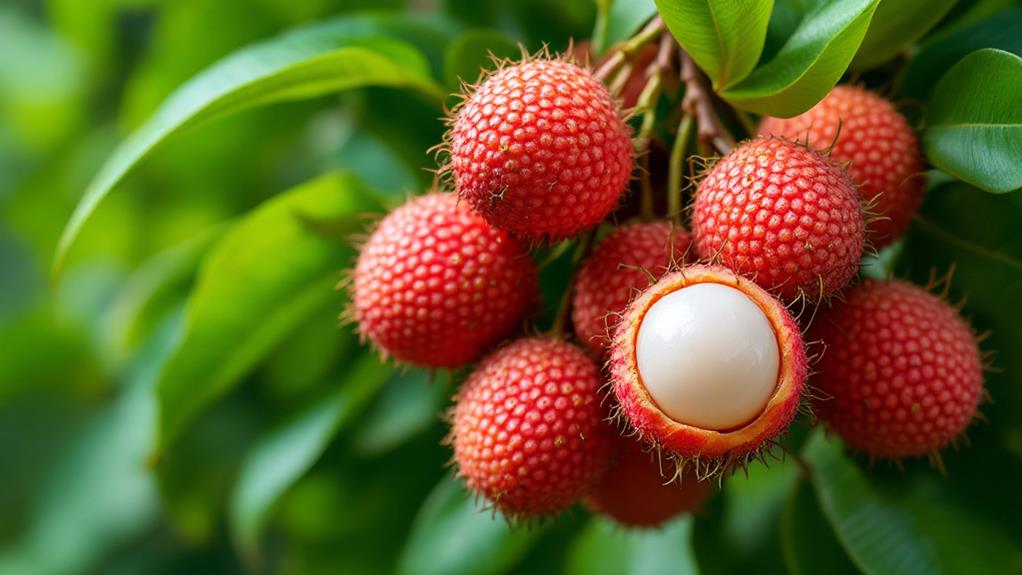
If durian's bold flavor isn't quite your cup of tea, you might find lychee to be a delightful substitute. This tropical fruit, native to southern China, boasts a sweet, fragrant flavor that's sure to invigorate your palate. With its high water content, lychee makes a perfect hydrating snack, especially during warmer months. Packed with over 100% of your daily vitamin C needs in just one serving, lychee supports your immune system and promotes skin health.
Beyond its delicious taste, lychee offers significant health benefits. It contains potassium and polyphenols, crucial for heart health. The antioxidant properties of lychee help reduce inflammation, making it a nutritious enhancement to your diet. Typically available fresh in spring and summer, you can also enjoy canned lychee year-round. Don't forget to peel the fresh fruit to reveal its juicy, grape-like texture.
Lychee's versatility shines in the kitchen. Regardless of being tossed into a fruit salad, blended into a dessert, or infused into a revitalizing beverage, it adds a tropical flair to your dishes. So, the next time you're seeking a sweet, healthy treat, consider reaching for lychee. You won't regret it!
Breadfruit
Have you ever tried breadfruit? This starchy tropical fruit is a nutritional powerhouse you might want to incorporate into your diet. Packed with dietary fiber, breadfruit offers about 7.99 grams per serving, making it a fantastic choice for promoting digestive health. Plus, it's rich in vital nutrients like potassium and vitamin C, which are key for maintaining your immune function and general wellness.
When it comes to preparing breadfruit, its versatility is impressive. You can bake, fry, or boil it, making it a great substitute for potatoes or rice. Not only does it keep meals interesting, but it also supports a healthy diet with only 103 calories per cup. Here's what you can expect from this amazing fruit:
- Nutrient-rich: High in vitamin C and potassium.
- Low-calorie option: Only 103 calories per cup.
- High in dietary fiber: Enhances digestive health.
- Versatile cooking: Can be baked, fried, or boiled.
- Sustainable: Grown in tropical regions with minimal resources.
Primarily grown in the Caribbean and Southeast Asia, breadfruit is gaining recognition for its role in sustainable agriculture. So, if you're looking for a nutritious and eco-friendly supplement to your meals, breadfruit might just be the perfect choice.
Jackfruit
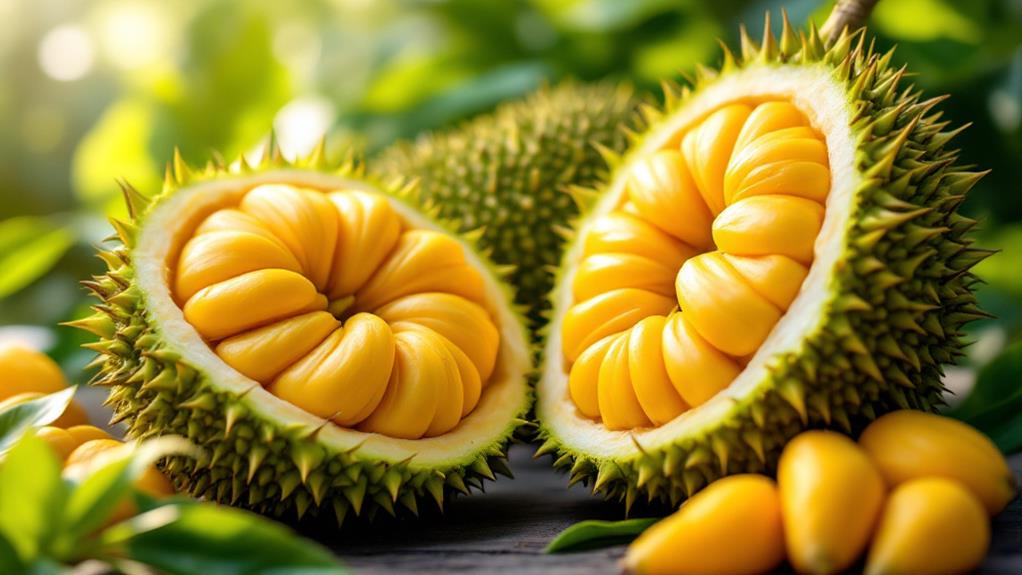
Jackfruit, with its massive size and spiky green skin, is a tropical marvel that hails from India and is celebrated as the largest edible fruit, sometimes weighing up to 80 pounds (36 kg). It's a tropical fruit that's both intriguing and versatile, packed with benefits you shouldn't overlook. Rich in vitamin C, jackfruit supports your immune system and promotes healthier skin, making it a fantastic supplement to your diet.
This tropical fruit is also high in fiber, providing 3.6 grams per 100 grams. That means it aids digestion and makes you feel fuller longer, which is great if you're watching your weight. The unripe jackfruit is famous for its fibrous texture, making it an excellent meat substitute in vegan dishes. It absorbs flavors beautifully, so it's perfect for savory recipes like tacos and curries.
When ripe, jackfruit transforms with its sweet flavor, making it delightful to enjoy fresh. You can also blend it into smoothies or incorporate it into desserts for a nutritious, low-calorie treat. So, irrespective of your search for a meat alternative or a sweet tropical delight, jackfruit offers a deliciously healthy option to investigate.
Dragon Fruit
Dragon fruit, with its striking bright pink skin and speckled flesh, offers both visual appeal and a burst of nutrition. This exotic fruit, also known as pitaya, is low in calories but high in vitamin C, providing 3.0 mg per 100 g. This elevates your immune system and improves skin health. Dragon fruit is also a good source of iron, crucial for producing red blood cells and preventing anemia.
When you incorporate dragon fruit into your diet, you'll enjoy a range of benefits:
- Vitamin C: Supports immune function and skin health.
- Iron: Vital for oxygen transport and energy production.
- Calcium and Magnesium: Contribute to bone health.
- Dietary Fiber: Promotes healthy digestion.
- Low-Calorie Count: Makes it great for weight management.
Dragon fruit's mild sweet flavor adds a delightful tropical twist to fruit salads and smoothies. Available fresh, frozen, or in powdered form, it's versatile enough for numerous culinary uses. You can find it in specialty grocery stores or farmers' markets, typically in season from June to September. By exploring dragon fruit, you'll not only diversify your palate but also guarantee you're packed with important nutrients.
Passion Fruit
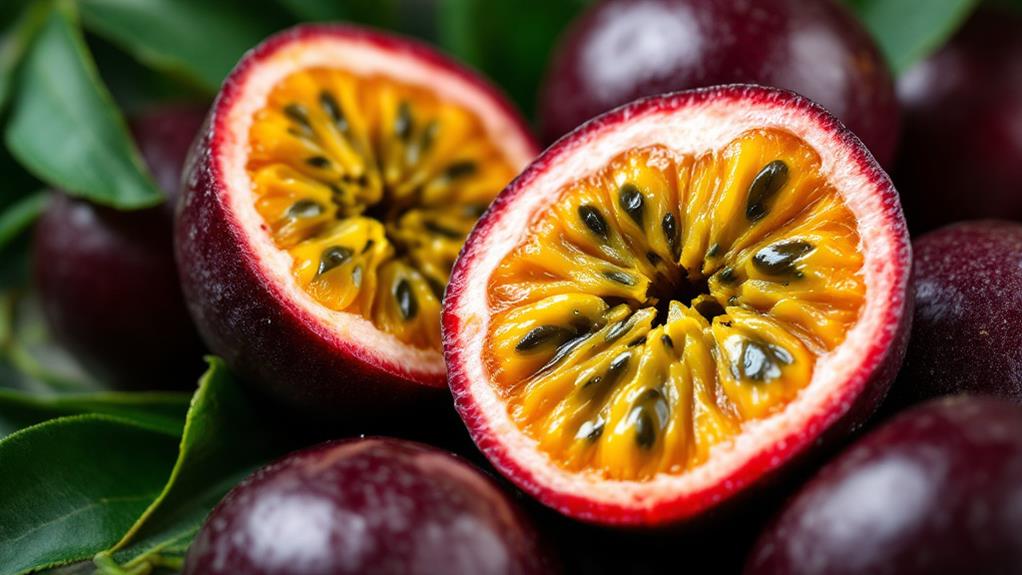
Plunge into the colorful world of passion fruit, a tropical delight that packs a punch with its rich antioxidant content, particularly vitamin C. One cup of this lively fruit provides about 70.8 mg of vitamin C, covering 79% of your daily value. This nutrient powerhouse doesn't just strengthen your immune system; it also supports skin health and helps protect cells from oxidative stress.
Passion fruit is more than just a vitamin C hero; it's also a champion for digestive health. With around 24.5 grams of fiber per cup, this tropical fruit improves your digestive system and promotes satiety, keeping you feeling fuller longer. It's a delicious way to guarantee you're getting enough fiber in your diet.
Beyond the health benefits, passion fruit's unique flavor—a delightful blend of sweet and tangy—adds a burst of excitement to any dish. Regardless of whether you enjoy it fresh, in purees, or as a flavorful enhancement to desserts and beverages, the versatility of passion fruit is undeniable. This tropical fruit also boasts about 821 mg of potassium per cup, supporting heart health and helping regulate blood pressure. Add passion fruit to your diet and savor every bite!
Star Fruit
After exploring the lively world of passion fruit, let's turn our attention to another exotic delight—star fruit, also known as carambola. Originating from Southeast Asia, this fruit is easily recognizable by its unique star shape when sliced. Not only does it make a striking enhancement to your plate, but star fruit is also a nutritional powerhouse perfect for those on a weight loss quest. With just 30 calories per 100 grams, it's a guilt-free way to enjoy something sweet and tart.
Star fruit is packed with vitamin C, offering 34% of your daily value per 100 grams, which is excellent for elevating your immune system and maintaining youthful skin. Furthermore, it's rich in antioxidants like flavonoids and polyphenols that help combat oxidative stress, keeping your body in balance.
Here are some ways you can enjoy star fruit:
- Fresh Slices: Enjoy it raw to savor its natural sweetness.
- Salads: Add a tropical twist to your greens.
- Smoothies: Blend it for a rejuvenating, nutritious drink.
- Garnish: Use it to decorate cocktails or desserts.
- Salsas: Pair it with spicy flavors for a unique condiment.
Incorporating star fruit into your diet can be both a delicious and healthful choice.
Rambutan
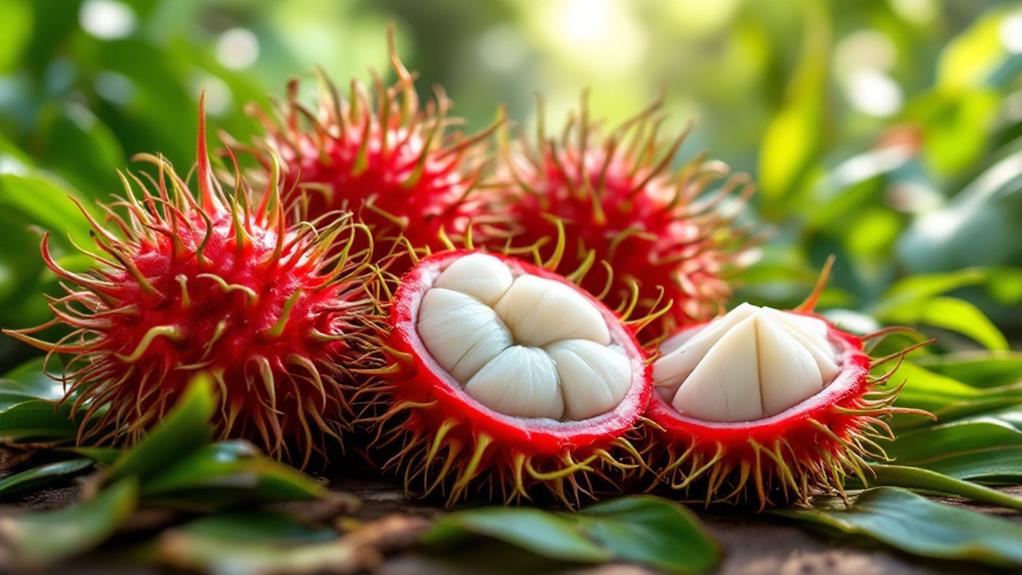
Rambutan is a tropical fruit that's sure to catch your eye with its hairy, spiky exterior. Native to Malaysia and Indonesia, this unique fruit is not only visually striking but also deliciously sweet and juicy, similar to lychee. When you bite into a rambutan, you'll enjoy its burst of flavor while benefiting from its nutritional profile. Packed with vitamin C, this fruit supports your immune system, helping you fend off colds and infections. Plus, it provides vital minerals like manganese and iron, which contribute to your comprehensive health.
Beyond its nutritional benefits, rambutan is an excellent choice for staying hydrated. Its high water content makes it a revitalizing snack, perfect for hot days when you need a hydration lift. Regardless of whether you enjoy it fresh, straight from the market, or in a fruit salad, rambutan offers a delightful taste experience. Remember, though, it's highly perishable, so consume it shortly after purchasing to savor its ideal freshness and flavor. You can also find it canned, which offers more versatility for adding to desserts. Accept this exotic tropical fruit, and investigate its sweet, juicy goodness in your diet.
Longan
Among the exotic fruits worth incorporating into your diet, longan stands out with its intriguing appearance and delightful taste. Native to Southeast Asia, this small, round fruit is often called "dragon eye" because of how it looks when peeled. The sweet, juicy flesh is not just a treat for your taste buds but also a powerhouse of nutrients.
Consider these benefits of longan:
- Rich in Vitamin C: With 84 mg per 100 grams, longan provides 93% of your daily vitamin C needs, enhancing your immune system and improving skin health.
- Packed with Antioxidants: The fruit is loaded with flavonoids and polyphenols, which combat oxidative stress and inflammation.
- Essential Minerals: It contains 267 mg of potassium per 100 grams, supporting heart health and muscle function.
- Versatile Consumption: Enjoy it fresh, dried, or canned, and incorporate it into desserts, soups, or herbal teas for a unique flavor.
- Cultural Significance: Widely used in Southeast Asia, longan is a staple in traditional dishes and remedies.
Acerola
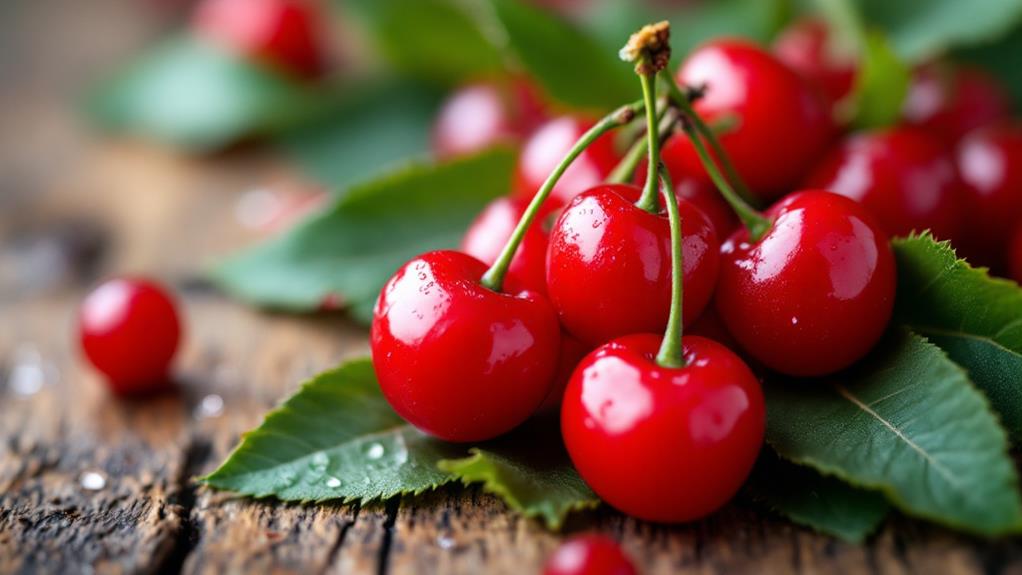
When exploring exotic fruits to enrich your diet, acerola is a lively and nutritious option you shouldn't overlook. Known as the Barbados cherry, this tropical fruit is a powerhouse of vitamin C. Just one cup provides an astounding 1,650 mg, or 1,833% of your daily value. Such a high concentration of vitamin C makes acerola unparalleled in supporting your immune function and promoting comprehensive skin health. It's not just about the vitamin C, though. Acerola is also packed with carotenoids and polyphenols, which are potent antioxidants that elevate its health benefits even more.
This small, bright red fruit thrives in the warm climates of Central America and the Caribbean. Its tart flavor is a delightful supplement to juices and smoothies, and its nutritional value makes it popular in dietary supplements. By incorporating acerola into your meals, you're not just adding a burst of flavor, but also tapping into its remarkable health-promoting properties. Regardless of your aim to bolster your immune function or simply enjoy more tropical fruits, acerola offers a delicious and effective way to improve your diet with its lively, nutrient-rich profile.
Soursop
Engage yourself in the world of soursop, a tropical delight also known as Graviola, that promises to enrich your diet with its unique blend of flavors and nutrients. This tropical fruit is a powerhouse of vitamin C, offering 46.4 mg per cup, which enhances your immune system and supports general health. With 7.42 g of fiber per cup, soursop also aids in digestion and helps you feel fuller longer, making it an excellent enhancement to your meals.
Soursop's flavor is a mesmerizing mix of sweet and tangy, lending itself perfectly to a variety of culinary uses. You can easily incorporate this fruit into smoothies, desserts, and beverages, adding both taste and nutritional value. High in antioxidants, soursop helps combat oxidative stress and may reduce inflammation in your body, contributing to better health.
Consider these alluring aspects of soursop:
- Tropical fruit grown in Central America, Southeast Asia, and South America.
- Available fresh, frozen, or as juice.
- Sweet and tangy flavor profile.
- Rich in vitamin C and fiber.
- Packed with antioxidants for health benefits.
Including soursop in your diet is a flavorful way to elevate your nutrient intake and enjoy exotic tastes.


